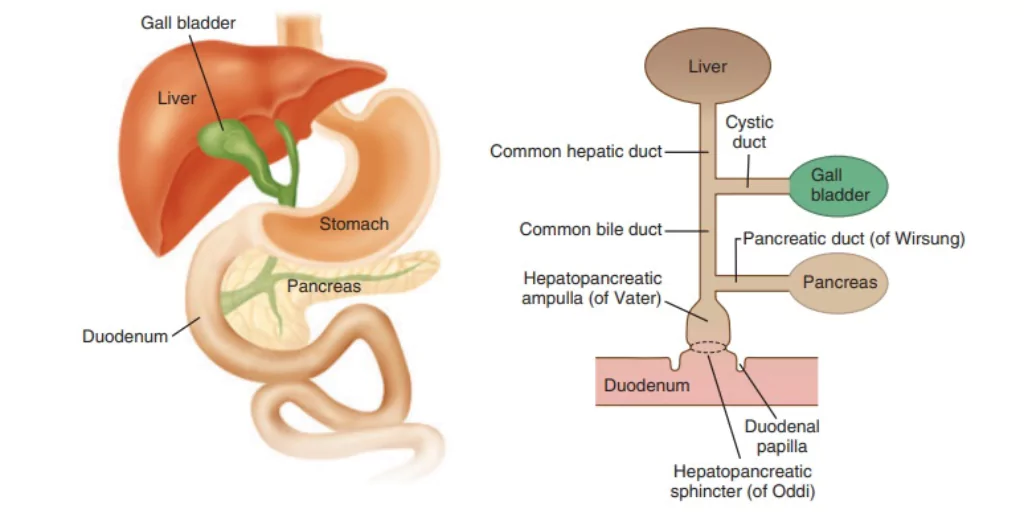Recently updated on May 4th, 2025 at 05:21 pm
Have you ever wondered why the liver is often called the body’s chemical factory? 🏭 This powerhouse organ plays a crucial role in your digestive process, yet its importance is often overlooked. Your Hepatic organ is not just a silent worker; it’s the mastermind behind numerous vital functions that keep your body running smoothly.
Imagine trying to digest a meal without your Hepatic organ. It would be like attempting to run a complex machine without its central processing unit. From breaking down nutrients to removing toxins, your liver is constantly at work, ensuring that every bite you take is properly processed and utilised by your body. But how exactly does it do this? What makes the Hepatic tissue so essential to your digestive health?
In this post, we’ll dive deep into the fascinating world of liver function and digestion. You’ll discover how this remarkable organ manages proteins, carbohydrates, and fats, and why it’s crucial for vitamin and mineral balance. We’ll also explore its detoxification powers and how it works in harmony with other digestive organs. Get ready to gain a newfound appreciation for your liver and its vital role in keeping you healthy and energised! 💪
1. Overview of the Liver’s Function in Digestion

Key role in nutrient processing
Your liver plays a crucial role in processing nutrients from the food you eat. It’s responsible for:
- Protein synthesis
- Carbohydrate metabolism
- Fat breakdown
- Vitamin storage
| Nutrient | Liver’s Role |
|---|---|
| Proteins | Synthesis of plasma proteins |
| Carbs | Glucose storage and release |
| Fats | Production of bile for digestion |
| Vitamins | Storage of vitamins A, D, E, K, and B12 |
Bile production and secretion
Bile, produced by your Digestive gland, is essential for fat digestion. It emulsifies fats, making them easier to absorb. Your liver continuously produces bile, storing it in the gallbladder for release when needed during meals.
2. Protein Metabolism and the Liver

Amino acid synthesis
This organ plays a crucial role in protein metabolism by synthesising essential amino acids. These building blocks are vital for various bodily functions, including muscle growth and tissue repair. The organ also converts excess amino acids into glucose for energy or fat for storage.
| Liver Function | Description |
|---|---|
| Amino Acid Synthesis | Creates essential amino acids |
| Protein Conversion | Transforms excess amino acids into glucose or fat |
Protein storage
3. Carbohydrate Processing
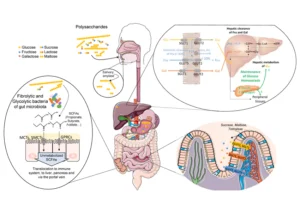
Glucose regulation
The hepatic organ plays a crucial role in regulating glucose levels in your blood. After a meal, the organ absorbs excess glucose and stores it as glycogen. When blood sugar drops, your liver releases stored glucose to maintain balance.
| Glucose Regulation | Liver’s Action |
|---|---|
| High blood sugar | Absorbs glucose |
| Low blood sugar | Releases glucose |
Glycogen storage
The liver is your body’s primary glycogen storage site. This stored form of glucose is an energy reserve, ready to be converted back when needed. Your liver can store approximately 100-120 grams of glycogen, providing a quick energy source between meals.
5. Fat Digestion and the Liver
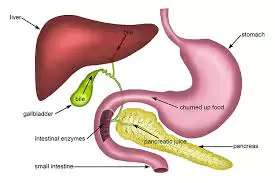
Bile production for fat emulsification
Your liver plays a crucial role in fat digestion by producing bile, a greenish-yellow fluid that emulsifies fats. Bile breaks down large fat globules into smaller droplets, increasing their surface area for easier digestion by enzymes.
| Bile Function | Effect on Fat Digestion |
|---|---|
| Emulsification | Breaks down large fat globules |
| Surface area increase | Enhances enzyme activity |
| pH regulation | Optimises fat absorption |
Cholesterol synthesis and regulation
The hepatic organ is the primary site for cholesterol synthesis and regulation in your body. It produces about 80% of the cholesterol you need, while the rest comes from your diet. The liver also:
- Regulates blood cholesterol levels
- Converts excess cholesterol into bile acids
- Removes cholesterol from the bloodstream
Also See: What is Digestion
6. Vitamin and Mineral Management
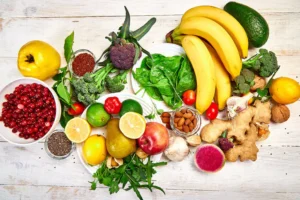
Storage of fat-soluble vitamins
The digestive gland plays a crucial role in storing fat-soluble vitamins (A, D, E, and K). These vitamins are essential for various bodily functions, including vision, bone health, and blood clotting. The organ stores excess vitamins and releases them when your body needs them, ensuring a steady supply even when dietary intake is low.
| Vitamin | Main Function | Storage Capacity |
|---|---|---|
| A | Vision | High |
| D | Bone health | Moderate |
| E | Antioxidant | Low |
| K | Blood clotting | Very low |
Iron metabolism
7. Detoxification and Waste Removal
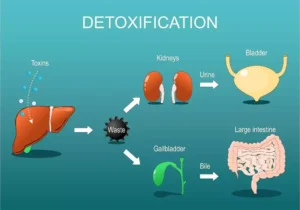
Drug metabolism
The hepatic system is a powerhouse for processing medications and toxins. It breaks down drugs through various enzymes, making them easier for your body to eliminate. This process, called drug metabolism, helps protect you from the potential harmful effects of medications and other substances.
| Drug Metabolism Step | Function |
|---|---|
| Phase I | Oxidation, reduction, and hydrolysis |
| Phase II | Conjugation for easier excretion |
Alcohol processing
When you consume alcohol, your organ works overtime to break it down. Enzymes like alcohol dehydrogenase and aldehyde dehydrogenase convert alcohol into less harmful substances. This process helps protect your body from alcohol’s toxic effects, but excessive drinking can overwhelm your liver’s capacity.
8. Liver’s Interaction with Other Digestive Organs
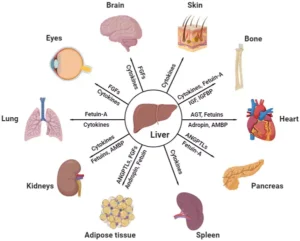
Pancreas collaboration
The vital organ works in tandem with the pancreas to regulate blood sugar levels. When you eat, the pancreas releases insulin, prompting the liver to store excess glucose as glycogen. Conversely, when blood sugar drops, the organ breaks down glycogen to release glucose.
| Organ | Function | Interaction with the Liver |
|---|---|---|
| Pancreas | Insulin production | Blood sugar regulation |
| Gallbladder | Bile storage | Fat digestion |
| Small intestine | Nutrient absorption | Nutrient processing |
Gallbladder regulation
Your organ produces bile, which is stored in the gallbladder. When you consume fatty foods, the gallbladder releases bile into the small intestine, aiding in fat digestion. This collaboration ensures efficient breakdown and absorption of fats in your diet.
Conclusion
Your liver plays a crucial role in the digestive process, far beyond what you might initially think. From protein metabolism and carbohydrate processing to fat digestion and vitamin management, this powerhouse organ is constantly working to keep your body functioning optimally. It even acts as your body’s natural detoxifier, removing harmful substances and waste products from your system.
Understanding the liver’s importance in digestion can help you make informed decisions about your health. By maintaining a balanced diet, staying hydrated, and avoiding excessive alcohol consumption, you can support your liver’s function and overall digestive health. Remember, a healthy liver contributes to a healthier you, so take care of this vital organ to ensure it continues to perform its essential roles in your digestive process.


